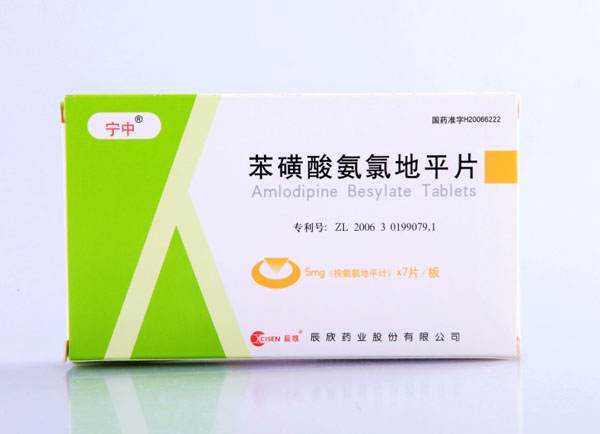Description: Amlodipine besylate is the besylate salt of Amlodipine, a long-acting calcium channel blocker. Amlodipine besylate is chemically described as 3-Ethyl-5-methyl (±) -2-[(2 - aminoethoxy)methyl]-4-(2-chlorophenyl)-1,4-dihydro-6-methyl-3,5-pyridinedicarboxylate, monobenzenesulphonate.Amlodipine besylate is a white crystalline powder with a molecular weight of 567.1. It is slightly soluble in water and sparingly soluble in ethanol. Amlodipine besylate tablets, as white tablets equivalent to 2.5, 5, and 10 mg of Amlodipine for oral administration. In addition to the active ingredient, Amlodipine besylate, each tablet contains the following inactive ingredients: microcrystalline cellulose, corn starch, sodium starch glycolate and magnesium stearate.
Pharmacological effects: Amlodipine is a dihydropyridine calcium antagonist (calcium ion antagonist or slow-channel blocker) that inhibits the transmembrane influx of calcium ions into vascular smooth muscle and cardiac muscle. Experimental data suggest that Amlodipine binds to both dihydropyridine and nondihydropyridine binding sites. The contractile processes of cardiac muscle and vascular smooth muscle are dependent upon the movement of extracellular calcium ions into these cells through specific ion channels. Amlodipine inhibits calcium ion influx across cell membranes selectively, with a greater effect on vascular smooth muscle cells than on cardiac muscle cells. Negative inotropic effects can be detected in vitro but such effects have not been seen in intact animals at therapeutic doses. Serum calcium concentration is not affected by Amlodipine. Within the physiologic pH range, Amlodipine is an ionized compound (pKa=8.6), and its kinetic interaction with the calcium channel receptor is characterized by a gradual rate of association and dissociation with the receptor binding site, resulting in a gradual onset of effect. Amlodipine is a peripheral arterial vasodilator that acts directly on vascular smooth muscle to cause a reduction in peripheral vascular resistance and reduction in blood pressure.
Pharmacokinetics: After oral administration of therapeutic doses of Amlodipine besylate, absorption produces peak plasma concentrations between 6 and 12 hours. Absolute bioavailability has been estimated to be between 64 and 90%. The bioavailability of Amlodipine besylate is not altered by the presence of food.Amlodipine is extensively (about 90%) converted to inactive metabolites via hepatic metabolism with 10% of the parent compound and 60% of the metabolites excreted in the urine. Ex vivo studies have shown that approximately 93% of the circulating drug is bound to plasma proteins in hypertensive patients. Elimination from the plasma is biphasic with a terminal elimination half-life of about 30–50 hours. Steady-state plasma levels of Amlodipine are reached after 7 to 8 days of consecutive daily dosing. The pharmacokinetics of Amlodipine is not significantly influenced by renal impairment. Patients with renal failure may therefore receive the usual initial dose. Elderly patients and patients with hepatic insufficiency have decreased clearance of Amlodipine with a resulting increase in AUC of approximately 40–60%, and a lower initial dose may be required. A similar increase in AUC was observed in patients with moderate to severe heart failure.
Indications: Amlodipine Besylate Tablets are indicated for the treatment of hypertension, to lower blood pressure. Lowering blood pressure reduces the risk of fatal and nonfatal cardiovascular events, primarily strokes and myocardial infarctions. Amlodipine besylate tablets are indicated for the symptomatic treatment of chronic stable angina.Amlodipine besylate tablets are indicated for the treatment of confirmed or suspected vasospastic angina.
Precautions: Symptomatic hypotension is possible, particularly in patients with severe aortic stenosis. Because of the gradual onset of action, acute hypotension is unlikely. Worsening angina and acute myocardial infarction can develop after starting or increasing the dose of Amlodipine besylate tablets, particularly in patients with severe obstructive coronary artery disease.Because Amlodipine besylate tablets are extensively metabolized by the liver and the plasma elimination half-life (t 1/2) is 56 hours in patients with impaired hepatic function, titrate slowly when administering Amlodipine besylate tablets to patients with severe hepatic impairment.
Adverse reaction: Because clinical trials are conducted under widely varying conditions, adverse reaction rates observed in the clinical trials of a drug cannot be directly compared to rates in the clinical trials of another drug and may not reflect the rates observed in practice. Cardiovascular: arrhythmia (including ventricular tachycardia and atrial fibrillation), bradycardia, chest pain, peripheral ischemia, syncope, tachycardia, vasculitis. Central and Peripheral Nervous System: hypoesthesia, neuropathy peripheral, paresthesia, tremor, vertigo.Gastrointestinal: anorexia, constipation, dysphagia, diarrhea, flatulence, pancreatitis, vomiting, gingival hyperplasia.General: allergic reaction, asthenia, back pain, hot flushes, malaise, pain, rigors, weight gain, weight decrease.Musculoskeletal System: arthralgia, arthrosis, muscle cramps, myalgia. Psychiatric: sexual dysfunction, insomnia, nervousness, depression, abnormal dreams, anxiety, depersonalization. Respiratory System: dyspnea, epistaxis. Skin and Appendages: angioedema, erythema multiforme, pruritus, rash, rash erythematous, rash maculopapular. Special Senses: abnormal vision, conjunctivitis, diplopia, eye pain, tinnitus.Urinary System: micturition frequency, micturition disorder, nocturia. Autonomic Nervous System: dry mouth, sweating increased.Metabolic and Nutritional: hyperglycemia, thirst.Hemopoietic: leukopenia, purpura, thrombocytopenia.These events occurred in less than 1% in placebo-controlled trials, but the incidence of these side effects was between 1% and 2% in all multiple dose studies.

